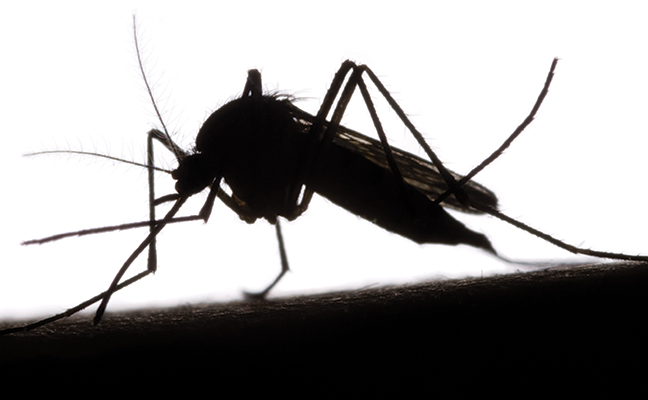Customers have compelling reasons for requesting mosquito control, PMP’s survey shows.
The reasons why pest management professionals (PMPs) offer mosquito management services have not changed much over the years. Some solid motives include increasing revenue, satisfying customer demand and accepting new opportunities. But what’s most compelling these days is disease prevention.
As stewards of public health, PMPs help prevent mosquito-borne viruses and disease, including the Zika virus, West Nile virus (WNV), chikungunya, dengue, malaria, yellow fever and Eastern equine encephalitis. Look no further than your own backyard for the threat of these illnesses.
The U.S. Centers for Disease Control and Prevention (CDC) says 47 states and Washington, D.C., reported WNV infections in 2017. Of the 2,002 confirmed and probable cases of WNV, 121 people died.
“In my home state of Illinois, there were 87 cases reported last year, resulting in five deaths,” says Adam Ring, owner of A-Action Pest Control in Antioch, Ill. “We feel compelled to do our part to help reduce these risks for our customers.”
Also last year, the CDC advised the public that Zika cases had been reported in Texas, Florida, Puerto Rico, U.S. Virgin Islands, and American Samoa. As of March 2018, there were more than 42,800 confirmed cases of Zika in the U.S. and its territories. Will Zika make headlines again in 2018?
“It’s our guess — and believe me, this is a guess — that Zika is not going to be a big issue this year,” says American Mosquito Control Association (AMCA) Technical Advisor Joseph Conlon. “We’ve taken significant steps to prepare ourselves for Aedes aegypti and A. albopictus surveillance and control.”
He may be on to something. Pest Management Professional’s (PMP’s) 2018 Mosquito Management Survey reveals the number of respondents who said their customers specifically asked whether their services control mosquitoes that carry the Zika virus dropped. This year’s survey shows 44 percent whereas last year, that figure was 55 percent.
Education is critical
With mosquito-borne illnesses in the headlines, education has helped convey the importance of mosquito management efforts. “Mosquitoes and their associated diseases are mentioned regularly in all forms of media today,” says Ring. “By educating our customers on the biology, habitat and health risks of mosquitoes, our customers quickly learn we are dedicated to controlling populations and protecting their families.”
With mosquito-borne illness top of mind for many customers, mosquito management work is picking up for the PMPs who offer it. The majority of PMPs asked — 78 percent — expect mosquito control jobs to increase in 2018.
“We are excited for 2018, and look to triple our 2017 numbers,” Ring says. Although his company initially only provided one-time mosquito treatments before customers’ special events, in 2017 the company got serious about mosquito control.
“We hadn’t thoroughly educated ourselves on mosquitoes, and simply attempted to treat them via insecticide treatments alone,” he says. “Reviews were mixed back then, and I decided to stop treatments altogether.”
During a pest management conference, he adds, discussions with PMPs who successfully offer mosquito management services changed that.
“I realized I had the wrong mindset, and that I had previously performed mosquito control incorrectly,” Ring says. “I returned to my office motivated and dedicated to mosquito control education and certification.”
Now, A-Action Pest Control technicians are licensed through the Illinois Department of Agriculture and the Illinois Environmental Protection Agency.
“In 2017, our first year, we added more than 130 mosquito control program customers,” Ring says. Better yet, reviews from customers have been “fantastic,” he adds.
Long-lasting customers
A-Action technicians carefully inspect customers’ properties and structures to identify potential breeding sites, as well as optimal insecticide application sites. Ring says he expects his company’s thorough, successful treatments to lead to lifelong customer relationships and referrals.
“We inform our customers of steps they can take to eliminate breeding sites on their properties,” he says. “This partnership ensures a long-term relationship.”
Scott Fortson, president of Terminix Service Inc. in Columbia, S.C., agrees with the notion that providing mosquito management helps to retain customers across all services.
“Your happy existing pest control customers hear about the mosquito control services performed at their neighbors’ or friends’ homes,” he explains. “If you don’t offer mosquito control, you risk customers leaving you to go to a competitor who offers both general pest and mosquito control services.”
Demand for mosquito management services is high in Fortson’s area, thanks to its proximity to the coast. For the past 12 years, his company has made his customers’ backyards more enjoyable.
“You have kept pests from entering their homes; now you can keep mosquitoes from bothering them in the backyard,” he says. “Customers perceive this additional service to be very beneficial because they are not tied to the inside and can enjoy the outside.”
Most PMPs say the revenue their mosquito management services generate come from residential customers, according to PMP’s 2018 Mosquito Management Survey. It accounts for more than half of their mosquito management business, said 60 percent of those asked.
Unpredictable populations
Is it possible to predict whether mosquitoes will turn out in force in a given year? For PMPs like Fortson, there’s no telling how long mosquito season may last. In most of his service area, it runs April through October. But when spring — and the warmer temperatures it brings — arrives early, he sometimes receives calls in late February and March.
Precipitation is a factor, too. Stagnant water collecting in containers and holes, as well as puddles of water slow to recede after a storm, are ideal breeding places. Areas experiencing drought will have mosquitoes with increased biting intensity, Conlon says.
It’s extremely difficult to predict mosquito populations, which makes the PMP’s role all the more important.
“One never knows when the next disease is going to hit,” Conlon says. “We need to be prepared, and PMPs are part of that preparatory infrastructure.”




Leave A Comment